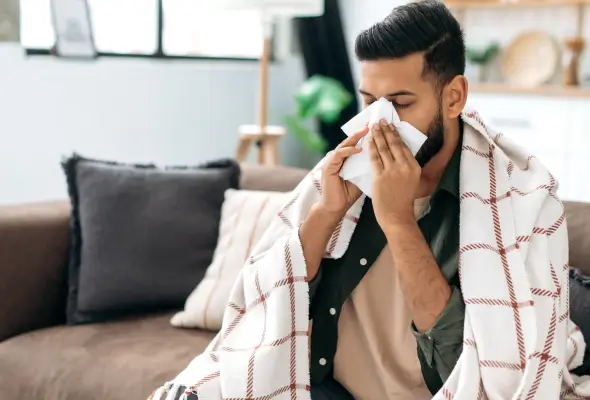-
Doctors
-
Specialities & Treatments
Centre of Excellence
Specialties
Treatments and Procedures
Hospitals & Directions HyderabadCARE Hospitals, Banjara Hills CARE Outpatient Centre, Banjara Hills CARE Hospitals, HITEC City CARE Hospitals, Nampally Gurunanak CARE Hospitals, Musheerabad CARE Hospitals Outpatient Centre, HITEC City CARE Hospitals, Malakpet
HyderabadCARE Hospitals, Banjara Hills CARE Outpatient Centre, Banjara Hills CARE Hospitals, HITEC City CARE Hospitals, Nampally Gurunanak CARE Hospitals, Musheerabad CARE Hospitals Outpatient Centre, HITEC City CARE Hospitals, Malakpet Raipur
Raipur
 Bhubaneswar
Bhubaneswar Visakhapatnam
Visakhapatnam
 Nagpur
Nagpur
 Indore
Indore
 Chh. Sambhajinagar
Chh. SambhajinagarClinics & Medical Centers
Book an AppointmentContact Us
Online Lab Reports
Book an Appointment
Consult Super-Specialist Doctors at CARE Hospitals

Sneezing
Symptom, Causes, Diagnosis and Treatment
Sneezing
Have you ever wondered why we sneeze? Sneezing is a common bodily function that most people experience daily. This sudden, forceful expulsion of air from the nose and mouth serves as a protective mechanism, helping to clear irritants from our nasal passages. Understanding the causes of sneezing and how to manage it can significantly improve our daily comfort and well-being.
In this article, we'll explore the various triggers that lead to sneezing, including common cold sneezing and reasons for continuous sneezing.

Causes of Sneezing
Several factors can cause sneezing:
- Allergies: The immune system identifies harmless organisms as threats, leading to sneezing as the body tries to expel them. Common allergens include pollen, dust mites, pet dander, and mould spores.
- Viral Infections: Over 200 different viruses can cause the common cold, with rhinovirus being the most frequent culprit. Flu viruses also trigger sneezing.
- Environmental Irritants: Dust, smoke, and strong odours can irritate nasal passages and cause sneezing.
- Medications: Inhaling corticosteroids through nasal sprays can sometimes lead to sneezing.
- Other Causes: Cold air, spicy foods, and even strong emotions like stress can result in sneezing. Stress releases hormones and chemicals, including histamine, which can cause allergy-like symptoms.
Treatment for Sneezing
To manage sneezing, doctors focus on addressing the underlying cause. Doctors may recommend allergy testing to identify specific triggers for allergies that often trigger sneezing. Once identified, patients can take steps to avoid these allergens.
Over-the-counter (OTC) medications prove effective in many cases. Antihistamines help block histamines, reducing sneezing and other allergy symptoms. Glucocorticosteroid nasal sprays also offer relief.
For those with severe allergies, an allergist might suggest immunotherapy. The doctor injects small amounts of allergens to build resistance over time. In cases where bacterial infections cause sneezing, antibiotics may be prescribed.
Complications of Sneezing
While sneezing is typically a harmless reflex, it can occasionally lead to complications, such as:
- Broken blood vessels in the face may result from the forceful nature of sneezing. This happens when the sudden pressure causes small capillaries to burst, resulting in visible red spots.
- Ear injuries present another concern. The powerful expulsion of air during a sneeze can cause pressure changes, potentially leading to ruptured eardrums. This complication may result in temporary hearing loss or discomfort.
- Sneezing can also impact the sinuses. If mucus from a sneeze drains into the sinuses, it might cause a sinus infection. This condition, known as sinusitis, involves inflammation of the sinus cavities and can cause discomfort and congestion.
- In rare cases, sneezing might contribute to more serious conditions like pneumonia. This happens when bacteria or viruses enter the lungs, causing a severe infection.
When to See A Doctor
People should visit their doctor if they develop any of the following symptoms alongside sneezing:
- Fever
- Nausea and vomiting
- Shortness of breath (dyspnoea)
- Hives
- Itchy or watery eyes
- Diarrhoea
- Congestion
- Sore throat
Home Remedies for Sneezing
Several home remedies can help manage sneezing, including:
- One effective method involves blowing the nose to remove irritants that trigger the sneeze reflex. Keeping soft tissues with lotion nearby proves helpful for this purpose.
- Some people find success in pinching their nose at the nostrils or near the top, just below the eyebrows, when they feel a sneeze coming on.
- Another technique involves tickling the roof of the mouth with the tongue for 5 to 10 seconds or pressing the tongue against the front teeth until the urge to sneeze passes.
- Increasing vitamin C intake through citrus fruits, vegetables, or supplements may reduce sneezing due to its antihistamine properties.
- Drinking daily chamomile tea might lower histamine levels in the body, potentially decreasing sneezing frequency.
Prevention
Preventing sneezing involves identifying and avoiding triggers. For those with allergies, determining specific allergens through testing is crucial. Once identified, individuals can take steps to minimise exposure.
- Avoid sneezing triggers, such as dust, pollen, animal dander, mould, spices, bright lights, and certain foods.
- People with photic sneezing, a condition where bright light causes sneezing, can wear sunglasses on sunny days.
- Those who sneeze after eating spicy foods may benefit from reducing their intake of chilli peppers, bell peppers, and other irritating ingredients.
- Use protective gear and proper ventilation in occupational settings where cement, chemicals, or sawdust is common.
- Using nasal sprays, particularly those containing capsaicin, can desensitise nasal tissue and reduce sneezing frequency.
Conclusion
Sneezing is a complex bodily function that impacts our daily lives. While sneezing is usually harmless, it's crucial to be aware of potential complications and know when to seek medical advice. By implementing preventive measures and being mindful of our individual triggers, we can reduce the frequency of sneezing and enjoy a more comfortable day-to-day experience. Remember, sneezing is not just a reflex but a fascinating aspect of our body's natural defence system.
To Book an Appointment, call:
Still Have a Question?




